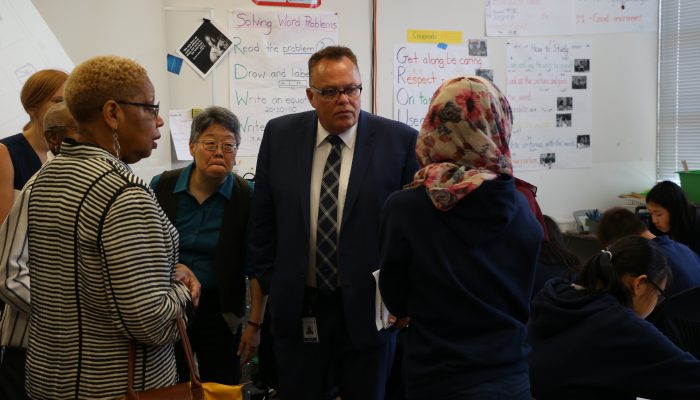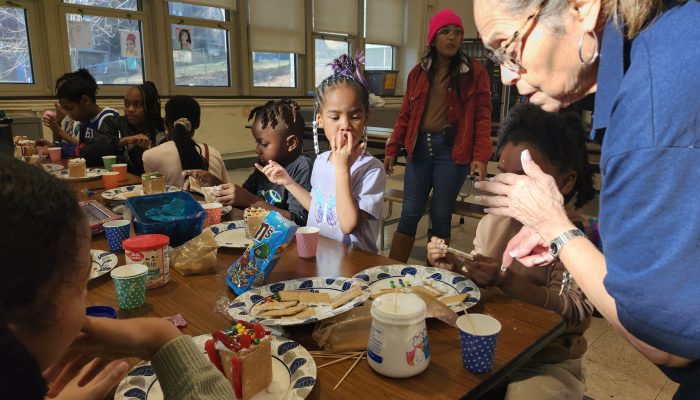Christopher McGinley is one of the first nine members appointed by Mayor Kenney to the Philadelphia Board of Education (BOE) in April 2018. Beginning in July 2018, the Board will oversee the School District of Philadelphia.
Chris is the product of Philadelphia schools, and comes from a family of educators. He currently serves as coordinator for the Educational Leadership Program at Temple University where he is an associate professor. Chris became a mayoral appointee to the School Reform Commission in January 2017 and in that year helped to shepherd significant progress for the District, including advocating for a new contract with the Philadelphia Federation of Teachers and the decision to return the District to local control. Chris has experience as a Philadelphia public school teacher, principal, and district level administrator. He has also served as a Superintendent in Lower Merion School District and Cheltenham School District.
What area of the city do you call home? What are your hobbies?
I live in Fairmount, but I grew up in the Northeast. I have a large family with 5 children and 2 grandchildren, so I spend time with them. When I can, I like to go to the shore. I like to travel when I can and often travel to go scuba diving.
Who were the people in your life who helped you to form your values?
My parents were very involved in education. My mother worked in the library at Frankford High and my father was teacher and principal. He was the president of CASA (Commonwealth Association of School Administrators) for 23 years. Many members of my family work or have worked in education primarily with the School District of Philadelphia.
Tell us about your educational journey. What inspired you to pursue the majors and degrees you now have?
I started college as a business major. While at college I coached youth soccer and was involved in working with children. I found that I was pretty good at motivating and relating to kids, so I switched my undergraduate major to elementary education. I later earned a master’s in special education.
I really enjoyed working as a teacher in special education, and became active in leadership roles at school. This experience led to my decision to return to Temple to earn a principal certification.
While I was working as a principal, the School District launched an initiative to develop leaders beyond the school level. I was one of twenty principals selected to participate in a leadership program at a Penn. I became a cluster leader and worked in central office in the District before moving to the suburbs. While I was superintendent in Cheltenham, I decided to pursue my doctorate in organizational leadership at Penn.
What are your personal goals for your service on the Board?
My goal going into the school board is to ensure that we’re having many more public dialogues through a healthy committee structure, so we get input from knowledgeable people across the community. A goal of mine is to ensure more community dialogues about schools and schooling. I had a good experience in suburban school districts with board committee structures and deep, healthy engagement with parents and others in the process of forming policies and adopting programs. We can do that in Philadelphia.
What do you hope to learn or gain a better understanding of during the listening tour and future engagement with the community?
Hearing from the public is really an essential part of governance in the district. Understanding how families experience the School District is critical to our ability to make good decisions. The more we understand what it’s like to be a parent in South Philadelphia, West Philadelphia, and throughout the city, the better we’ll be able to respond to the needs of schools.
I think that there’s an important role for the School Board to play in building trust and engaging the public so that Philadelphians know the people in leadership roles are really passionate and genuinely committed.
What was your first impression of the slate of Board appointees?
It’s certainly a much more diverse group in terms of interests and backgrounds than the School Reform Commission, and I think that there are going to be a lot of healthy discussions around the issues that come up. As a career educator and school administrator I have a very different background than other people on the board. I hope my experience will be a resource, but I also respect the expertise of other people who are serving on the board.
What are you most excited about this new opportunity?
Having worked in the School District when there was a board and having seen effective board members work in the best interest of kids, I’m excited about the return to a school board with more representatives from various parts of the city. I’m looking forward to having a more comprehensive dialogue about what’s going on in the School District.
People see the governance role of the board but not what board members do in the background to solve problems, resolve issues. There have been board members in the past who contributed substantially to the District’s well-being by giving advice, sharing expertise and attracting resources, and I hope the new board can do that.




